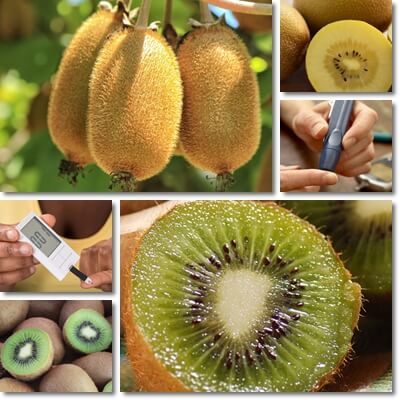As a diabetic, you can eat kiwifruit with your condition so long as you limit intake to small portions. Despite some fruits being moderate-glycemic, for the most part, kiwifruit is low-glycemic with a score of a little over 50, meaning it doesn’t raise blood sugar too fast too much. Kiwifruit benefits diabetes by being a moderate source of carbohydrates and not very high in sugar either. The raw fruit is a significant source of vitamin C which holds benefits primarily for wound healing and contains small amounts of potassium and magnesium with minor benefits for diabetes-associated high blood pressure.
Kiwifruit and blood sugar
How does eating kiwifruit with diabetes type 2 affect your blood sugar? Kiwis are not very high in sugar and have an overall moderate carbohydrate content: 14.66 g of carbs for 100 g of raw, green kiwi, of which 8.99 g are sugars and 3 g dietary fiber. Naturally, they raise blood sugar levels. To what extent is another matter however. Based on its carbohydrate content and profile, kiwi is not one of those fruits that raise blood sugar too fast too much, when eaten in moderation. More accurately, the rise it generates is somewhat steady and manageable, allowing for some degree of blood sugar control.

It’s important to stress that kiwifruit and diabetes type 2 make a good pair so long as the fruit is consumed in small amounts. The less you eat at once, or the smaller the portion, the fewer carbohydrates you are getting to fuel the rise in blood sugar. Because it’s not necessarily a low-sugar fruit like tomatoes, for example, kiwi has the potential to raise blood sugar levels. However, its glycemic effects are dependent on intake so, as a diabetic, you will benefit from having small servings at once.
Kiwifruit glycemic index
The glycemic index (GI) is a scale that predicts how a food affects blood sugar, more exactly, how fast the carbohydrates in it are broken down into sugar and absorbed into the bloodstream. Between 0-55 is a low GI. Between 56-69 is a moderate GI. Between 70-100 is a high GI. The lower the GI score of a food, the lesser its effects on blood sugar. Conversely, the higher the GI, the more pregnant the effects.
The position of kiwifruit on the glycemic index varies from as little as 47 to 58 or higher. That means that the fresh fruit is sometimes low GI, other times moderate GI. The variation in glycemic index score can be explained by the different nutritional profiles of individual fruits, belonging to either the same or a different variety. However, the average kiwifruit glycemic index is above 50 and below 55, making it a low GI fruit for the most part (GI values for both green and golden kiwi). When consumed reasonably, kiwifruit should have rather minimal effects on blood sugar, even with diabetes.

Kiwifruit glycemic load
The glycemic load (GL) is a scale that predicts how fast the carbohydrates in a serving of a food get broken down into sugar and absorbed into the bloodstream. Below 10 is a low GL. Between 11-19 is a moderate GL. Over 20 is a high GL. The glycemic load score is determined based on the glycemic index multiplied by the number of total carbohydrates in a given serving, divided by 100. Given a GI score of 50-55, the average glycemic load for green and golden kiwifruit ranges from low to moderate.
Glycemic load of green kiwifruit
- The glycemic load of green kiwifruit is 7-8, a low score (determined for a serving of 100 g providing 14.66 g of carbs).
- The glycemic load for one cup of the sliced fruit is 13-14.5, a moderate score (180 g a cup, providing 26.39 g of carbs).
- The glycemic load for one green kiwifruit is 5-6, a low score (2-inch fruit weighing about 69 g, providing 10.12 g of carbs).
Glycemic load of yellow/golden kiwifruit
- The GL of golden kiwifruit is 8-9, a low score (determined for a serving of 100 g, providing 15.79 g of carbs).
- The GL of one golden kiwifruit is 6-7, a low score (81 g a fruit, providing 12.79 g of carbs).
Kiwifruit benefits for diabetes
How are kiwis good for diabetics more exactly? Kiwifruit benefits diabetes only when consumed in small amounts, according to the diabetic person’s individual nutritional requirements, as part of an overall balanced and varied diet.
Probably the biggest benefit of the fruit for diabetes specifically is its usually low-glycemic index score which indicates it has limited effects on blood sugar, when consumed reasonably, of course.
Fresh kiwifruit is further good for diabetics thanks to its high vitamin C content: 92.7 mg of vitamin C per 100 g of the green variety and 161.3 mg of vitamin C per 100 g of the golden variety. Vitamin C holds benefits primarily for wound healing, initiating collagen production for skin repair which is good for diabetic ulcers. Vitamin C further exerts antibacterial, anti-inflammatory and immune-boosting effects.
It additionally holds minor benefits for cardiovascular health, a major aspect of diabetic health. With around 10% of the recommended daily intake of vitamin E for an average adult, both green and golden kiwifruit further contribute to wound healing and cardiovascular health.
Kiwifruit is a source of B vitamins (B1, B2, B3, B5, B6, B9 and choline) which help with diabetes-associated nerve damage. Together with vitamins C and E, B vitamins hold benefits for high blood cholesterol, a common occurrence associated with the metabolic condition.
The fruit also contains small amounts of magnesium (17 mg per 100 g in the green variety, 12 mg in the golden variety) and potassium (over 310 mg per 100 g in both varieties). Both magnesium and potassium are good for diabetes-associated hypertension, helping lower blood pressure numbers in diabetics.
Lastly, kiwifruit is a good source of dietary fiber, indigestible plant material with blood sugar-lowering effects (3 g per 100 g in the green variety and 1.4 g in the golden variety). Having a few kiwifruits with a glass of water on an empty stomach in the morning exerts laxative effects and helps relieve constipation.
